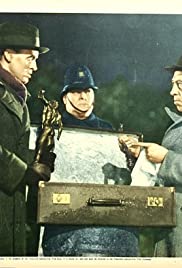
INSPECTOR HORNLEIGH
UK, 1939, 76 minutes, Black-and-white.
Gordon Harker, Alastair Sim, Miki Hood, Wally Patch, Steven Geray, Edward Underdown, Hugh Williams, Gibb Mc Laughlin, Ronald Adam.
Directed by Eugene Forde.
This is the first of three light comedy, murder mysteries featuring Inspector Hornleigh and his associate, Bingham. The inspector is played by comedian, often policeman, Gordon Harker. His associate is Alastair Sim, in his mid-30s, already bald, featuring his Scottish accent, capitalising on his ability at a dithering manner.
The film opens with a murder, the inspector at an auction wanting to buy a precious stamp but interrupted by his associate, his going to the scene of the crime, getting the clues. It turns out that the motive for the crime was getting the Chancellor’s briefcase with budget papers. This means a visit to the Chancellor and getting the help of his assistant, played by Edward Underdown.
This leads to a cafe where the Chancellor and his associate had a cup of tea, spilled the tea on the bag – which leads to the conclusion that the bag was substituted in the cafe. The owner is played by Miki Hood, in love with the Chancellor’s associate. The range of suspects at the cafe includes the co-owner and brother, Hugh Williams, desperately in need of money. There is a visiting salesman who turns out to be a private Detective, Wally Patch. There is the manager of the cafe – who definitely looks very sinister, Ronald Adam. Also involved is a financier played by Steven Geray. In the background there is the man who acts as waiter-Butler. He is played by Gibb Mc Laughlin and, as the least likely to be the villain, is, of course, unmasked as the villain.
The murder mystery is interesting with its political overtones. Gordon Harker obviously enjoys himself as the inspector, sometimes imposing on, sometimes supporting, his associate – with Alastair Sim stealing many of the scenes in which he appears.
The film was directed by American director of small budget films of the 30s and 40s, Eugene Ford. There were two sequels.